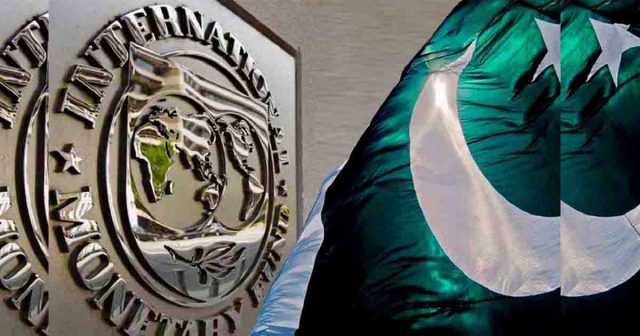Pakistan looks for IMF bailout again
October 10, 2018 | Expert Insights

The new government of Pakistan gives the go-ahead to approach the International Monetary Fund to seek a bailout again to overcome the financial crisis the country is facing.
Background
The economy of Pakistan is the 25th largest in the world benchmarked to global purchasing power parity and 42nd largest in terms of nominal gross domestic product. However, Pakistan's unaccounted economy, i.e., activities that are not taken into consideration such as work done by homemakers or income generated by the unorganised sector while calculating the per capita income is estimated to be 36% of its overall economy.
In October 2016, the IMF chief Christine Lagarde confirmed her economic assessment in Islamabad that Pakistan's economy was 'out of crisis'. However, in recent times Pakistan’s economy is going through a rough patch. Debt is soaring, the current-account deficit is widening, reserves are falling, and the currency has been devalued four times in just eight months.
Pakistan has so far approached the IMF twelve times to seek a bailout. Recently, in 2013, the government of Nawaz Sharif agreed to terms for an IMF loan of $6.6 billion disbursed over 36 months. The country’s new government led by Imran Khan is said to place all state-owned companies into a special fund to be managed at arm’s length from the government soon after taking office. This was aimed to be the first step towards mass privatisation as the country seeks IMF bailout.
Analysis
The Finance Minister Asad Umar said that after consulting with “leading economists”, Pakistan will formally approach the IMF for support. He also told the Financial Times that the Prime Minister, Imran Khan had decided to hold talks with the IMF and the country’s central bank to discuss the present financial crisis in the country.
The Minister also said, “We have inherited a difficult situation where you have a fiscal deficit which shot up by about 2.5% over the target in the last financial year, and where the monthly current account deficit is more than $2bn. This is not sustainable.”
Maurice Obstfeld, the fund’s chief economist, expressed the same, he said, “Pakistan is suffering from a number of imbalances: a very large fiscal imbalance, a large current account imbalance, they also have a low level of reserves and a currency that is too rigid and overvalued.”
The Prime Minister is under pressure to generate external funding as the country faces financial blowouts. The country is also struggling to keep a stock of foreign currency. The foreign currency reserves have plunged 40% in 2018 - its lowest in almost four years. At the end of September, the central bank’s holding was just $8.4bn in reserve which is down from $13.9bn the previous year. The country is also running twin current account deficit and budget deficits of more than 5% of its GDP. The country is facing a balance of payment crisis of nearly $18bn in deficit.
Following the announcement by the Finance Minister, the rupee fell more than 7% to PKR 134 to the dollar, based on figures reported by Reuters. Thus, the currency is now more than 25% lower as against the US dollar.
At the end of September despite the dwindling finances in the country, the country has raised interest rates to the highest in three years. The State Bank of Pakistan said in a statement that the target policy rate was increased to 8.5% from 7.5%. The objective of the raising interest rates was to boost up confidence in the country.
The Finance Minister aims that the new IMF programme will have a “minimum impact” on low-income people and simultaneously pass the burden on the wealthy citizens. He said, "We have to break this cycle of going to the IMF.”
Uzair Younus, a South Asia director at Washington-based consultancy Albright Stonebridge Group LLC expressed Pakistan’s approach to the IMF “was a matter of when not if. For an economy that has become addicted to foreign loans and bailouts, the future is very much like the past.”
Counterpoint
The IMF is considered as the lender of last resort for developing countries experiencing balance of payment crisis. Ian Vásquez, the director of the Cato Institute’s Project on Global Economic Liberty, had said that there are three demerits for countries who seek a bailout from the IMF. Firstly, moral hazard: The more the IMF bails out countries, the more they would expect countries to slip into crises in the future because it encourages risky behaviour on the part of governments and investors. Secondly, IMF bailouts of Asian countries are expensive, bureaucratic, and fundamentally unjust solutions to currency crises. At first, the financial aid cuts investors’ losses rather than allowing them to bear the full responsibility for their decisions. Finally, they undermine superior, less expensive market solutions.
Assessment
Our assessment is that in addition to seeking a bailout from the IMF, Pakistan had recently approached China for support. We believe that China has made a clear intent to uphold the “Iron brother” status with its all-weather ally Pakistan. However, the US has been highly critical of the closeness of the two countries and its numerous approaches to the IMF for seeking a bailout. We believe that Pakistan’s critical situation makes them vulnerable, thus, pushing them to approach all alternatives for support, with the objective of stabilising their economy.
Read more:








Comments